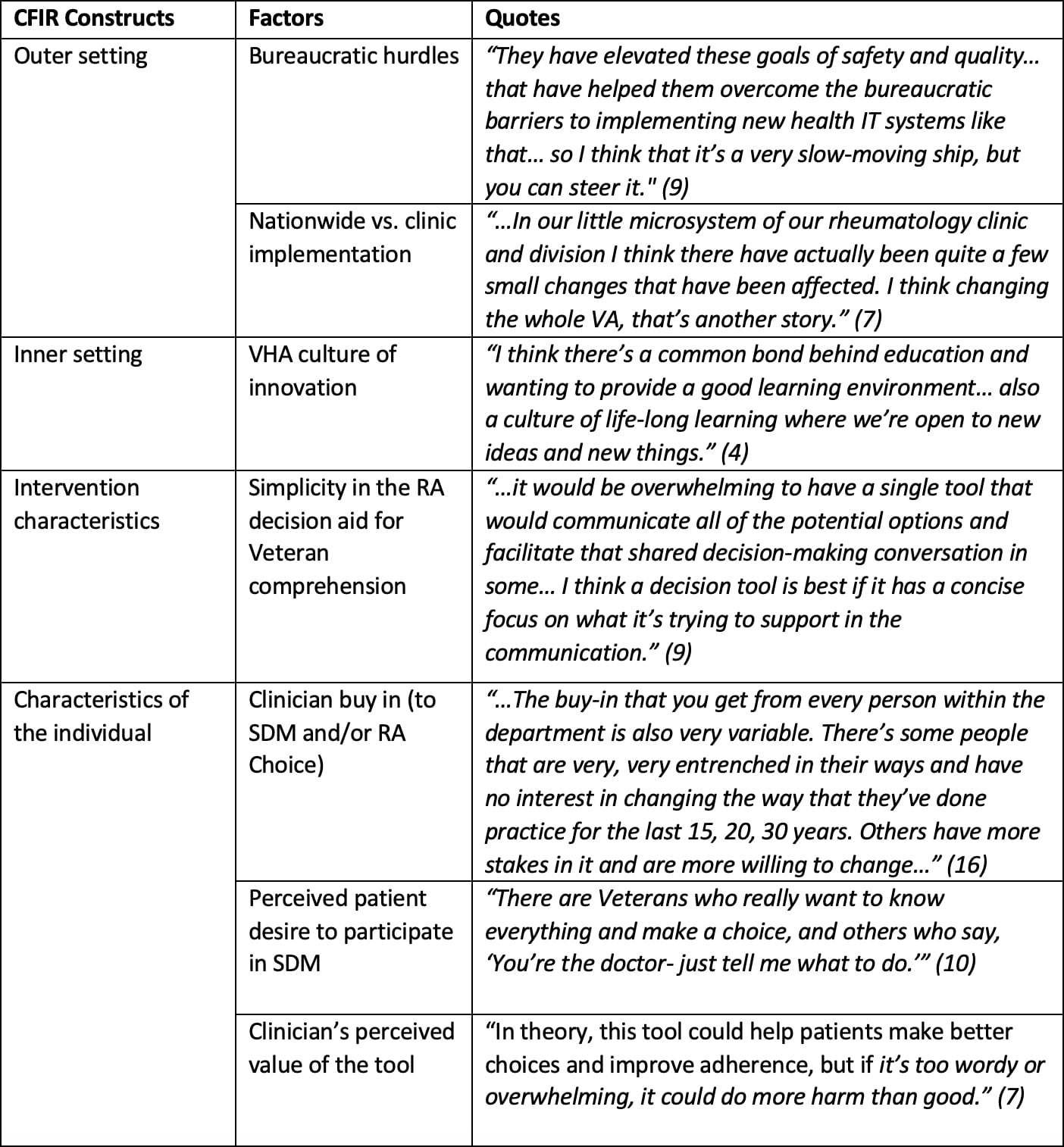Session Information
Date: Sunday, October 26, 2025
Title: (0357–0386) Patient Outcomes, Preferences, & Attitudes Poster I
Session Type: Poster Session A
Session Time: 10:30AM-12:30PM
Background/Purpose: Shared decision-making (SDM) is the first overarching principle of the treat-to-target guidelines for rheumatoid arthritis (RA). The quality of SDM varies widely, and its adoption in practice remains limited. To address this gap, a decision aid tool for RA “RA Choice” was introduced as part of a multicomponent intervention (e.g., clinician communication training, medication summary guide, patient activation brochure) in a stepped-wedge, randomized controlled trial (RCT; NCT05530694) across multiple rheumatology clinics within the Veterans Health Administration (VHA). Prior to the launch of the intervention, during the usual care phases of the trial across multiple sites, we aimed to explore clinician attitudes and beliefs regarding SDM and the use of RA Choice.
Methods: Between June 2023 and October 2024, we conducted semi-structured interviews with clinicians prior to the implementation of the multicomponent intervention which included RA Choice. The Consolidated Framework for Implementation Research (CFIR) provided a framework for interview question development. Recorded Interviews were transcribed verbatim and analyzed using a hybrid deductive/inductive qualitative content approach, guided by iterative Rapid Research Evaluation and Appraisal Lab (RREAL) sheets. The results were then organized using the CFIR.
Results: 16 semi-structured interviews were conducted with VHA rheumatologists (n=14) and nurse practitioners (n=2) across three intervention sites: Philadelphia (n=6), Portland (n=5), and San Francisco (n=5). Many clinicians were familiar with the concept of SDM and perceived it as beneficial to patient well-being. Participants stated that an ideal RA-focused decision aid should help patients describe their symptoms, including pain levels and mobility difficulties, support clinicians in explaining medical concepts, enhance the efficiency of SDM, and be accessible in a paper format. Participants also identified factors that would affect successful implementation of an RA-focused decision aid. These factors aligned with CFIR domains, including: Outer Setting issues like bureaucratic hurdles and national vs. clinic-level implementation, Inner Setting elements such as the VHA’s culture of innovation, and Intervention Characteristics like the tool’s simplicity for Veteran comprehension. They also emphasized Characteristics of the Individual, including clinician buy-in, patients’ willingness to engage in decision-making, and clinicians’ perceived value of the tool.
Conclusion: In this qualitative study, we identified patient, clinician, and institutional factors that may influence the use of the RA Choice decision aid during the pre-intervention phase of a multi-site, stepped-wedge RCT. This pre-intervention qualitative data identified clinician buy-in to the general usefulness of SDM as a concept and a cautious optimism around leveraging a tool to improve SDM, however this was tempered by perceptions of challenges encountered by large system bureaucracy and patient-level factors of limited literacy or low levels of engagement. Future research will focus on impacts of the intervention on Veterans’ experience of SDM.
 Table 1: Factors with exemplary quotes corresponding to the CFIR
Table 1: Factors with exemplary quotes corresponding to the CFIR
To cite this abstract in AMA style:
Hamblin A, Waller D, Tuepker A, Nasrallah C, Bennett A, Jespersen B, Baker J, Valiveti M, Schmajuk g, Barton J. “VA is a slow-moving ship, but you can steer it”: Clinician Views on Navigating Shared Decision-Making and Anticipated Use of an RA Decision Aid [abstract]. Arthritis Rheumatol. 2025; 77 (suppl 9). https://acrabstracts.org/abstract/va-is-a-slow-moving-ship-but-you-can-steer-it-clinician-views-on-navigating-shared-decision-making-and-anticipated-use-of-an-ra-decision-aid/. Accessed .« Back to ACR Convergence 2025
ACR Meeting Abstracts - https://acrabstracts.org/abstract/va-is-a-slow-moving-ship-but-you-can-steer-it-clinician-views-on-navigating-shared-decision-making-and-anticipated-use-of-an-ra-decision-aid/
